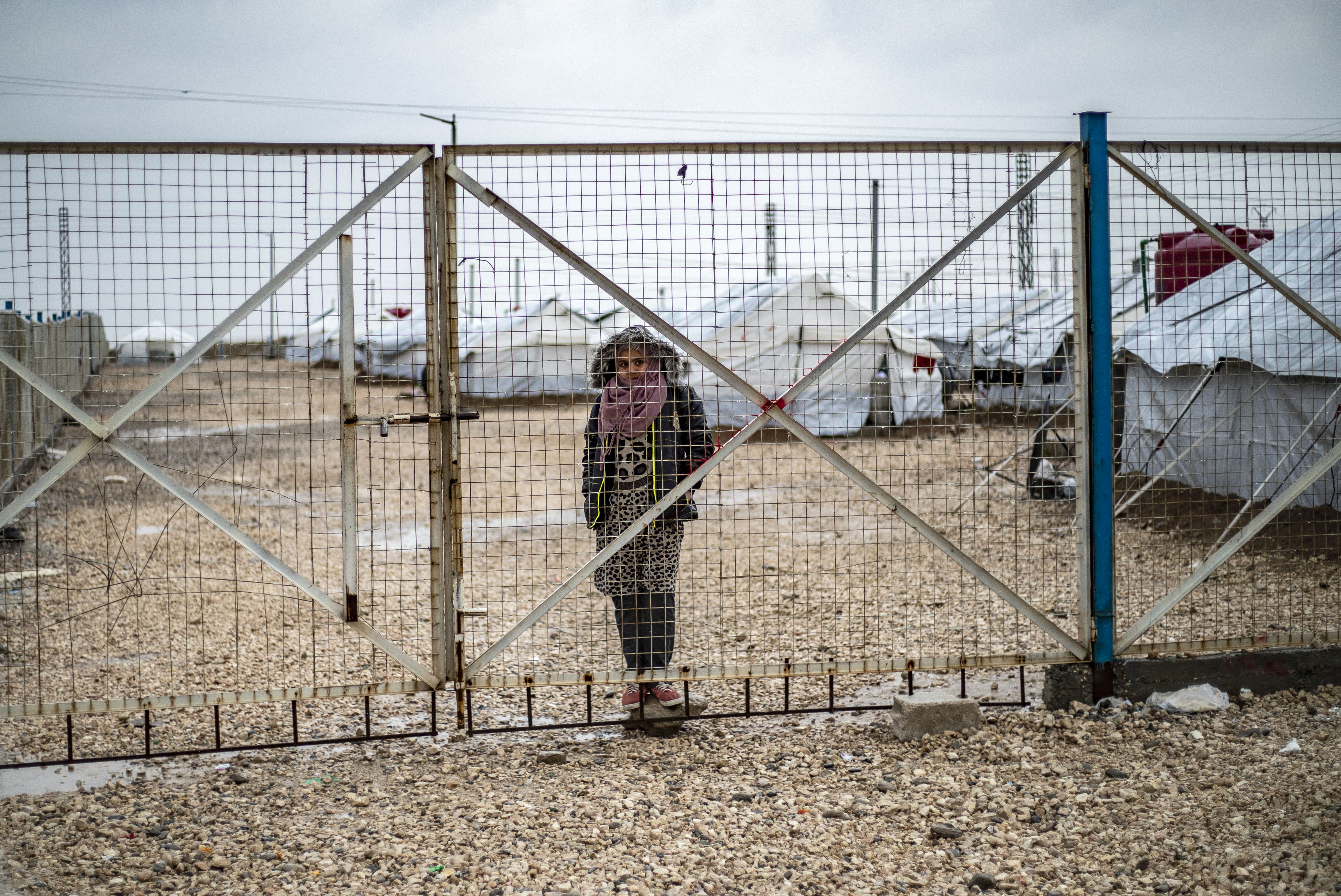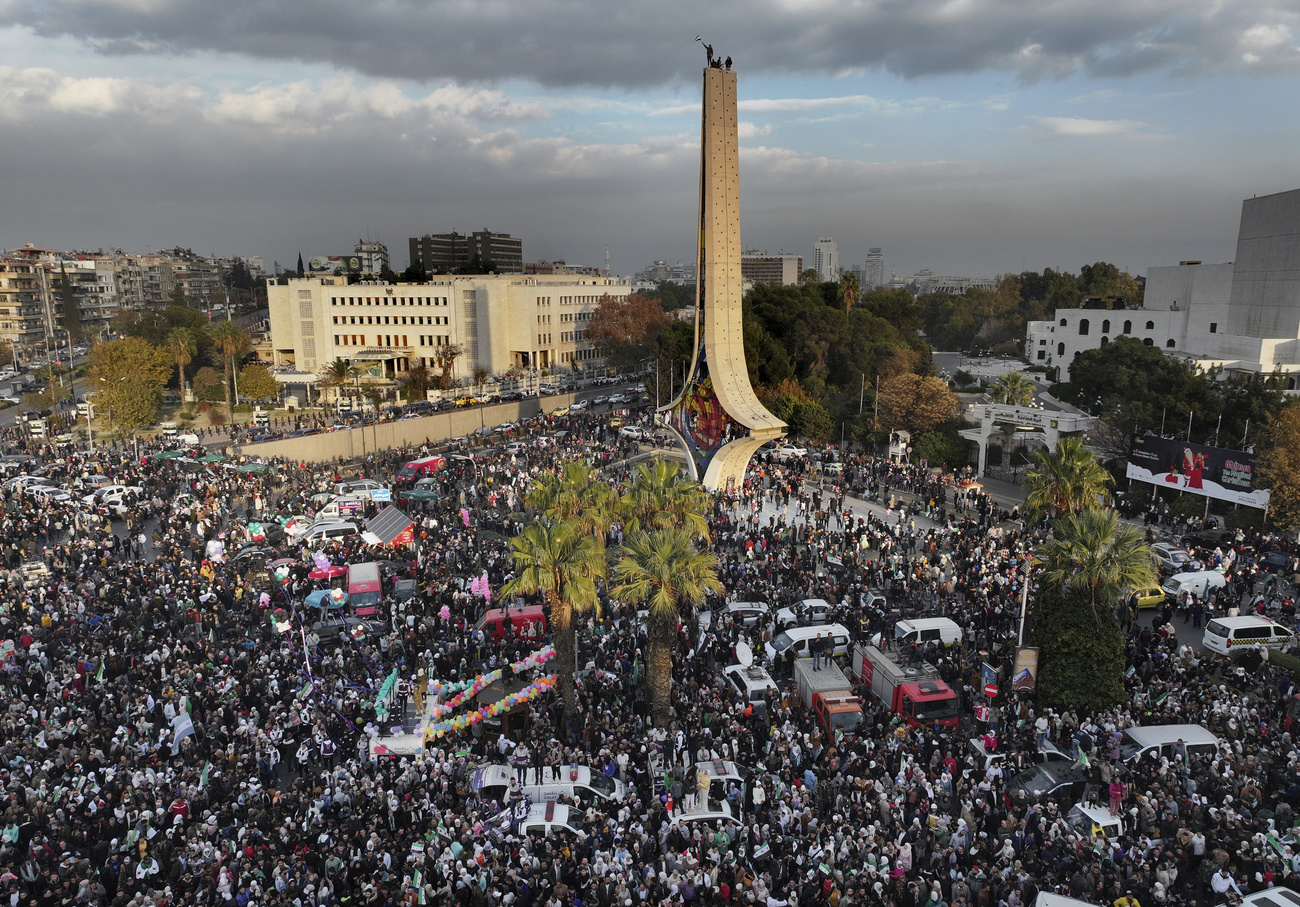
Lost in limbo: calls for repatriation of Swiss jihadist detainees in Syria grow louder

What will happen to Swiss nationals who joined the Islamic State terrorist group and who are now imprisoned in northeastern Syria? Human rights experts, humanitarian groups, and even the US are calling for repatriation. Switzerland says it won’t support their coming back.
For at least six years, three Swiss men have been held without trial in prisons controlled by Kurdish autonomous authorities in northeastern Syria. They are among the tens of thousands of jihadists from Europe and elsewhere that came to join the self-declared caliphate of the Islamic State (IS) in Iraq and Syria between 2014 and 2019. A Swiss woman and her eight-year-old daughter are also being held in Al-Roj, one of two camps where families of former IS fighters are detained.
But while some European countries and Iraq have begun to repatriate their nationals to prosecute them in their home country, Switzerland has so far refused, arguing that these prisoners should be tried in Syria or in Iraq.

“These individuals are arbitrarily detained,” Kastriot Lubishtani, a Swiss-based lawyer and researcher, tells Swissinfo. “We cannot leave these people in a kind of Guantánamo without trial and without access to a court.” He is referring to the US detention facility in Cuba where prisoners were held indefinitely without trial after the September 11, 2001, terrorist attacks.
Tens of thousands detained
In 2019, the US-backed Kurdish militia Syrian Democratic Forces (SDF) overthrew the self-declared IS caliphate in northeastern Syria. The SDF captured tens of thousands of foreigners and Syrians suspected of being IS members, along with their families, and has held them in prisons and the Al-Roj and Al-Hol camps ever since.
According to the United Nations, around 9,000 IS-suspected men are currently imprisoned without trial, including 5,400 Syrians, 1,600 Iraqis, and 1,500 individuals from 50 other countries. Additionally, some 42,500 people are arbitrarily detained in the two camps, including relatives of IS suspects, refugees, internally displaced persons, and victims of human trafficking: 60% of them are children; the rest are mostly women.

Avoiding Responsibility
Thousands of Iraqis are currently being repatriated from the camps with support from their government and the UN High Commissioner for Refugees (UNHCR). Progress is also being made to return Syrians displaced by the civil war. But third-country nationals remain.
“The majority of EU countries and other states have handed responsibility of their nationals over to the Kurdish authorities in northeastern Syria,” Matthew Cowling tells Swissinfo. Cowling is a humanitarian affairs manager for Doctors Without Borders (MSF) in northeastern Syria.

Urgent Repatriation Demanded
Lubishtani is not alone in his assessment that human rights are violated in the camps. UN experts and human rights organisations have also criticised serious violations of detainees’ rights.
“The change of government in Syria is a valuable opportunity to end the arbitrary, inhumane, and indefinite detention of around 52,000 people linked to the IS conflict,” declared 16 independent experts from the UN Human Rights Council in April 2025.
In December 2024 the forces of Hayat Tahrir al-Sham (HTS), a rebel group, captured Damascus and overthrew the regime of Bashar al-Assad, in power since 2000.
“These individuals have been held for at least six years without trial and under cruel, inhuman, and degrading conditions, which violate international law,” Lubishtani says. Tuberculosis, for example, is widespread in the prisons, he adds.
MSF operates two clinics in the larger Al-Hol camp, treating patients with diabetes and high blood pressure. However, specialised care such as ophthalmology, dental treatment, and neurology is lacking, they say. The International Committee of the Red Cross (ICRC) also runs a hospital in Al-Hol, visits detainees in prisons, and tries to facilitate contact between family members.
The UN experts called on all countries to urgently repatriate their nationals, rehabilitate and reintegrate them, or prosecute them if necessary. “We are concerned that many countries have abandoned their citizens or even arbitrarily revoked their citizenship,” they said.
The US also wants states to repatriate their citizens. Since the defeat of IS, US assistance has played a key role in managing and securing the Al-Hol and Al-Roj camps, as well as the SDF-run facilities where thousands of IS fighters are imprisoned, said acting US Ambassador to the UN in New York, Dorothy Shea, in February at the UN Security Council. “The US has shouldered too much of this burden for too long. We continue to call on countries to swiftly repatriate their displaced and detained nationals in the region,” she said.

More
New country, old fear: an overview of Syria’s realities
In January and February 2025, the US cut at least $117 million (CHF93 million) in humanitarian aid to northeastern Syria. It also plans to withdraw its troops still present in the region. The New York Times reported in April that troop numbers might be reduced from 2,000 to 500.
The freezing of US funds means the humanitarian situation in the camps is deteriorating, says a representative of a humanitarian organisation who wishes to remain anonymous. Maintaining basic services is becoming more difficult, while Kurdish security forces are overwhelmed by a population frustrated by shortages of food, gas, and heating in winter.
Switzerland Remains Inflexible
Some European countries have begun repatriating jihadists and prosecuting them, including Bosnia, Kosovo, and North Macedonia. The Netherlands and Germany have convicted jihadist returnees for war crimes. Alongside countries such as Norway, Sweden, and Denmark, they have also introduced deradicalisation and reintegration programs.
Switzerland remains inflexible. It does not actively repatriate adult terrorists abroad, the foreign ministry said in answer to questions sent by Swissinfo. This means, for example, that it will not support their repatriation by issuing them a passport.
The foreign ministry added that the original decision on the topic, made by the government in March 2019, remains valid.
The ministry provides consular protection to affected individuals “within the scope of what is possible and considering the situation since learning of their detention,” it said. It also pointed out that there is no legal entitlement to consular protection. Exceptions apply in cases where a person’s life or physical integrity is at risk.
The foreign ministry also said it is in contact with the detained Swiss nationals and Kurdish authorities. It said it recently conducted a consular visit to the Al-Roj camp, where the Swiss woman and her daughter are held. It has also established virtual contact with the three detained men.
Bern previously offered to repatriate the woman’s daughter alone, but the mother refused. The ICRC and UN bodies have repeatedly emphasised that children should not be separated from their mothers. “States must urgently repatriate children together with their mothers,” UN experts requested as early as 2023. All children in this conflict zone deserve protection, they said. These children are victims of terrorism and serious human rights violations, they added. In the camps, they lack access to basic needs such as medical care, food, clean water, and education.

Lubishtani also points out that Switzerland has obligations under the UN Convention on the Rights of the Child. It must repatriate children together with their mothers to ensure the children’s welfare – but it has rather prioritised domestic political interests over the children’s well-being, he says.
In 2019, the government justified its decision not to actively repatriate people who had travelled to the IS caliphate with reference to the security of the Swiss population. Some Swiss politicians argued that jihadists had voluntarily entered the areas and also voluntarily joined a terrorist organisation.
Lubishtani is convinced that Switzerland will eventually have to bring its nationals back. According to the European Court of Human Rights, former IS fighters have the right to an individual assessment of their situation. The Swiss Federal Court confirmed this ruling in December last year. Such people are also entitled to protection under international humanitarian law, which obliges states to repatriate their citizens.

More
Syria, the forgotten crisis?
It is unclear how the security situation will evolve under Syria’s new government and how cooperation between Damascus and the Kurds will develop, Lubishtani says.“Former IS fighters should therefore be repatriated as quickly as possible in a controlled framework, rather than risk them vanishing into thin air”
Back in Switzerland, they would initially be imprisoned, Lubishtani explains. If no war crimes can be proven, they would at least be convicted for participating in a criminal terrorist organisation. At the time of the offenses, this meant five years in prison.
Edited by Virginie Mangin/dos

In compliance with the JTI standards
More: SWI swissinfo.ch certified by the Journalism Trust Initiative






























You can find an overview of ongoing debates with our journalists here . Please join us!
If you want to start a conversation about a topic raised in this article or want to report factual errors, email us at english@swissinfo.ch.